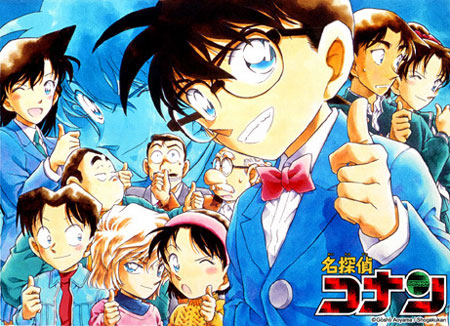Ask John: Why is Detective Conan So Popular?

Question:
Recently I’ve read surveys saying that adult Japanese fans think the two most interesting anime film franchises are Studio Ghibli works… and Detective Conan. Really?! I don’t mean to insult the detective series, but the massive appeal of “Conan-kun” among Japanese, especially Japanese women, is lost on me. Nor can I understand making any kind of meaningful qualitative comparison between the two franchises. Studio Ghilbi makes artistic, entertaining, and world-respected family films. Detective Conan is an amusing, episodic, and disposable children’s series about a boy detective solving the latest gruesome murder or kidnapping du jour.
Answer:
I’ve watched a generous handful of the over 500 Detective Conan television episodes, several of the series’ OVAs, and roughly half of the dozen motion pictures. So while I’m familiar with the series, I’m not certain that I can explain exactly why Detective Conan is so popular among Japanese viewers. Rather, I can present a theory composed of three parts. First, I think that Detective Conan is appealing because of its accessibility and fun. Second, I think that Detective Conan appeals to a particular Japanese fascination. And third, I suspect that Detective Conan has a particular romantic appeal to Japanese women.
Anyone that’s watched any Detective Conan anime should have to honestly admit that the series is interesting because it’s relatively fast paced, features a cast that’s easy to identify and understand, and features fun, kinetic action. Detective Conan is a very accessible series that entertains without pandering or alienating viewers by concentrating on cultish, otaku themes. In fact, hardcore anime fans may notice that Detective Conan is obviously tremendously popular in Japan, yet the series gets almost no coverage by Japanese anime magazines targeted at the hardcore otaku community, nor any merchandise targeted at the fanatic collector market. Detective Conan is a mainstream show to the degree that average Japanese viewers enjoy it while otaku that gravitate toward cultish and underground titles largely ignore it.
The fascination with Detective Conan may be rooted in a larger characteristic of Japanese society. A poll of over 14,000 Japanese residents recently conducted by Japanese research firm My Voice found that detective, mystery, and deductive reasoning themed anime was the fourth most popular genre among Japanese animation watchers, following behind family shows, Ghibli works, and Disney animation. Unlike America, where intelligence is ridiculed and ostracized in pop culture entertainment – from The Nutty Professor to Revenge of the Nerds – Japanese society’s adulation for education and intelligence appears frequently in anime such as Oniisama E…, Kareshi Kanojo no Jijoo, and Special A, and the popularity of detective/mystery titles including Kindaichi Shonen no Jikenbo, Tantei Gakuen Q, Death Note, and Meitantei Conan. Mainstream Japanese viewers seem to love watching anime that revolves around admirable, intelligent characters using their intellect and deductive reasoning to solve problems. Not only does the Detective Conan anime revolve around solving bizarre murders, the series also features a recurring theme of Professor Agasa confronting the series’ “children” with wordplay puzzles and riddles based on interpreting Japanese language.
While the fun of the show combined with the fascination of watching smart characters use their wits and intelligence to solve problems may make Detective Conan appealing to average Japanese viewers, the show’s romantic thread may make the series especially interesting for Japanese women. Note that I’m neither Japanese nor female, so this is merely personal speculation. A recurring theme in the Detective Conan anime is that Ran Mori is patiently devoted to her love for Shinichi Kudo, despite being separated from him, while at the same time Shinichi is secretly always nearby her and always protecting her in the guise of Edogawa Conan. The affection shared by this young couple, the heartbreak of Shinichi always being so close to Ran yet never able to console her, and the constant tease that at any time the series may turn a new corner by having Ran finally figure out Conan’s true identity, or allow Conan to finally reveal his predicament to Ran has a soap opera-esque quality that may be engrossing for average Japanese women that normally don’t follow anime.
While Japanese viewers often cite Detective Conan and Ghibli movies as similarly “interesting” anime, I don’t think that Japanese viewers are consciously suggesting that Detective Conan and Ghibli movies are inherently similar. I believe that Japanese viewers that compare Detective Conan and Ghibli films are comparing the satisfaction and enjoyment they get from watching anime rather than comparing the characteristics or content of the anime itself. Studio Ghibli films are enjoyable; for Japanese viewers, Detective Conan anime is also nearly as enjoyable. That parallel doesn’t mean that the content or quality of Ghibli movies is similar to Detective Conan movies. One can equally enjoy pizza and hamburgers; that doesn’t mean that pizza and hamburgers are composed of the same ingredients or have the same nutritional value.

